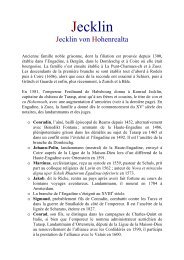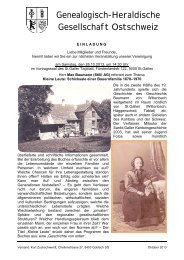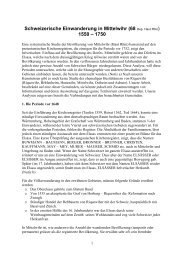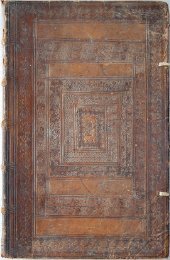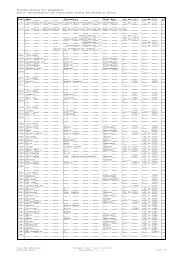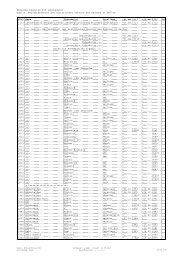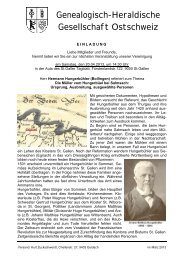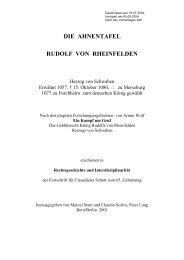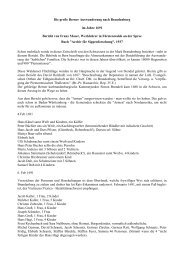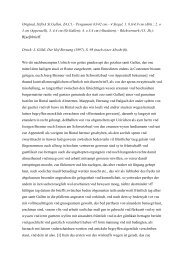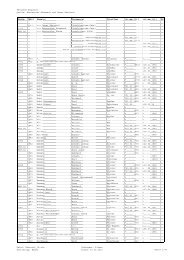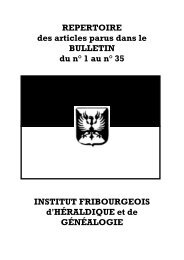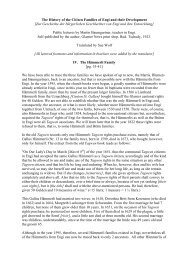The History of the Glarus Families, especially Those of the Sernf ...
The History of the Glarus Families, especially Those of the Sernf ...
The History of the Glarus Families, especially Those of the Sernf ...
Create successful ePaper yourself
Turn your PDF publications into a flip-book with our unique Google optimized e-Paper software.
today for all Glarner Catholics, <strong>the</strong> parishes <strong>of</strong> Mollis, <strong>Glarus</strong>, Schwanden, Betschwanden,<br />
Linthal and <strong>the</strong> <strong>Sernf</strong> valley belonged at that time to <strong>the</strong> Zürich deanery and <strong>the</strong> Konstanz<br />
[Baden] bishopric. But <strong>the</strong>n, as we heard, <strong>the</strong> Glarner clergy had proven <strong>the</strong>mselves obstinate<br />
concerning <strong>the</strong> payment <strong>of</strong> <strong>the</strong> bishop's tax, <strong>the</strong> so-called Consolations. To be sure, <strong>the</strong>y did<br />
not dispute <strong>the</strong> right to a bishop's tax, but probably <strong>the</strong>y protested against <strong>the</strong> amount <strong>of</strong> <strong>the</strong>se<br />
taxes to those to whom <strong>the</strong>y were obliged to pay <strong>the</strong>m, and since <strong>the</strong>se turned a deaf ear to<br />
<strong>the</strong>ir objections, it seems that <strong>the</strong>y went on strike, discontinuing any payment for a while.<br />
For <strong>the</strong> settlement <strong>of</strong> this dispute 10 , a court <strong>of</strong> arbitration <strong>the</strong>n convened in Zürich "in <strong>the</strong> upper<br />
room <strong>of</strong> <strong>the</strong> residence <strong>of</strong> <strong>the</strong> reverend fa<strong>the</strong>r in Christ, <strong>the</strong> Lord Gottfried, abbot <strong>of</strong> <strong>the</strong><br />
Rüti 11 cloister, <strong>of</strong> <strong>the</strong> Premonstratensian Order, whose residence was located on Rütiner lane<br />
in <strong>the</strong> village 12 ". <strong>The</strong> court <strong>of</strong> arbitration was composed <strong>of</strong> <strong>the</strong> above-mentioned Abbott<br />
Gottfried <strong>of</strong> Rüti, as well as <strong>the</strong> Federal Councillors Pantaleon <strong>of</strong> Inkenberg [Canton Zürich]<br />
and Heinrich Hagenauer, <strong>the</strong> younger, <strong>of</strong> Zürich. Before this court <strong>of</strong> arbitration appeared, on<br />
<strong>the</strong> one side, Dean Rudolf Windegger, priest <strong>of</strong> Nuolen [Canton Schwyz], treasurer Johannes<br />
Trutler, priest <strong>of</strong> Thalwil [Canton Zürich], Heinrich Hündler, administrator <strong>of</strong> <strong>the</strong> Busskilch<br />
[Canton Zürich] parish church, and Konrad Schmid, administrator <strong>of</strong> <strong>the</strong> Meilen [Canton<br />
Zürich] parish church, and, on <strong>the</strong> o<strong>the</strong>r side, as representative <strong>of</strong> <strong>the</strong> Glarner communes: Johannes<br />
Speich, lay priest <strong>of</strong> <strong>Glarus</strong>, and his colleague in Matt, Johannes Wanner, lay priest in<br />
<strong>the</strong> <strong>Sernf</strong> valley, accompanied by 3 secular leaders, former president Albr. Vogel (leader <strong>of</strong><br />
<strong>the</strong> Glarner people, who is well known to us all from <strong>the</strong> battle <strong>of</strong> Näfels), Ulrich Büeler, <strong>the</strong><br />
elder, and Peter Schindler. After both sides had entrusted <strong>the</strong> settlement <strong>of</strong> <strong>the</strong>ir dispute to <strong>the</strong><br />
hands <strong>of</strong> <strong>the</strong> court <strong>of</strong> arbitration mentioned above, unconditionally and without reservation,<br />
and had also pledged in advance that <strong>the</strong>y would be good friends and completely united from<br />
now on, and no party would find fur<strong>the</strong>r fault with <strong>the</strong> o<strong>the</strong>r and charge ano<strong>the</strong>r with something,<br />
<strong>the</strong> court <strong>of</strong> arbitration passed judgement that <strong>the</strong> Glarner church had to pay <strong>the</strong> treasurer,<br />
as collector <strong>of</strong> <strong>the</strong> Consolations, 9 pounds 17 Schillings every year, and likewise had to<br />
pay <strong>the</strong> overdue taxes. On <strong>the</strong> o<strong>the</strong>r hand, <strong>the</strong> accumulated expenses <strong>of</strong> both sides should be<br />
equally incurred.<br />
Far more serious and far-reaching were <strong>the</strong> proceedings, 100 years later, with which a Hans<br />
Speich had again assisted. In <strong>the</strong> year 1517, Canton <strong>Glarus</strong> had acquired <strong>the</strong> Werdenberg domain,<br />
not through a military conquest, but by purchase, for <strong>the</strong> sum <strong>of</strong> 21,500 Florins. At first<br />
<strong>the</strong>re was nothing but joy in Werdenberg over this acquisition <strong>of</strong> <strong>the</strong> Glarners. After all, <strong>the</strong>y<br />
really wished nothing else from <strong>the</strong> Glarners than that <strong>the</strong>y would be free people, filled with<br />
enthusiasm for freedom and equality; under <strong>the</strong>ir rule <strong>the</strong> Werdenbergers had also considered<br />
<strong>the</strong>mselves so much better <strong>of</strong>f than under <strong>the</strong> regiment <strong>of</strong> some sort <strong>of</strong> count from Heuwen or<br />
Sargans. To give this hope and joy expression, 130 "handsome fellows", probably, most <strong>of</strong> all,<br />
unmarried youths, accompanied <strong>the</strong>ir first provincial governor Steger to <strong>the</strong> Glarner fair.<br />
Well, in this imperfect world, it is not <strong>the</strong> same, however, if it is a question <strong>of</strong> our freedom or<br />
<strong>of</strong> <strong>the</strong> freedom that we should grant o<strong>the</strong>rs. That's why we have also experienced obvious examples<br />
yet again in 1918 and 1919. And so we are not too much surprised that <strong>the</strong> Werdenbergers<br />
also couldn’t help but discover only too soon that <strong>the</strong>ir situation had not become as<br />
much more beautiful and friendly as <strong>the</strong>y had expected by <strong>the</strong> change <strong>of</strong> rule. <strong>The</strong>n, in addition,<br />
<strong>the</strong> independence movement <strong>of</strong> <strong>the</strong> Reformation occurred. <strong>The</strong> preachers <strong>of</strong> <strong>the</strong> Gospel<br />
spoke so much <strong>of</strong> "<strong>the</strong> freedom <strong>of</strong> a Christian people", <strong>the</strong> Swabian farmers consequently believed<br />
that <strong>the</strong>y should experience something <strong>of</strong> this also in <strong>the</strong>ir situation; and, likewise, <strong>the</strong><br />
Werdenbergers, “excited by <strong>the</strong> sweetness <strong>of</strong> <strong>the</strong> freedom", believed that <strong>the</strong>y should also<br />
have a somewhat greater portion <strong>of</strong> <strong>the</strong> Protestant freedom. Not satisfied by that which <strong>the</strong>y



